Three Outlaw Samurai Blu-ray Movie
HomeThree Outlaw Samurai Blu-ray Movie 
三匹の侍 / Sanbiki no samuraiCriterion | 1964 | 94 min | Not rated | Feb 14, 2012
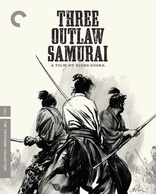
Movie rating
7.6 | / 10 |
Blu-ray rating
| Users | 0.0 | |
| Reviewer | 4.0 | |
| Overall | 4.0 |
Overview
Three Outlaw Samurai (1964)
A wandering, seen-it-all ronin becomes entangled in the dangerous business of two other samurai, hired to execute a band of peasants who have kidnapped the daughter of a corrupt magistrate.
Starring: Tetsur˘ Tanba, Isamu Nagato, Mikijir˘ Hira, Miyuki Kuwano, Yoshiko KayamaDirector: Hideo Gosha
| Foreign | Uncertain |
| Drama | Uncertain |
| Action | Uncertain |
Specifications
Video
Video codec: MPEG-4 AVC
Video resolution: 1080p
Aspect ratio: 2.35:1
Original aspect ratio: 2.35:1
Audio
Japanese: LPCM Mono
Subtitles
English
Discs
50GB Blu-ray Disc
Single disc (1 BD)
Playback
Region A (locked)
Review
Rating summary
| Movie | 4.5 | |
| Video | 4.5 | |
| Audio | 4.0 | |
| Extras | 1.0 | |
| Overall | 4.0 |
Three Outlaw Samurai Blu-ray Movie Review
Reviewed by Dr. Svet Atanasov January 12, 2012Japanese director Hideo Gosha's "Sanbiki no samurai" a.k.a "Three Outlaw Samurai" (1964) arrives on Blu-ray courtesy of Criterion. The only supplemental feature on the disc is the film's original theatrical trailer. The disc also arrives with an illustrated booklet featuring an essay by film critic Bilge Ebiri. In Japanese, with optional English subtitles for the main feature. Region-A "locked".

What a fool!
While wandering around the countryside, Shiba (Tetsuro Tanba, Harakiri, Blackmail is My Life), a fearless samurai, encounters three peasants who have kidnapped the daughter (Miyuki Kuwano, Late Autumn) of a cruel magistrate. They reveal to him that they are hoping to negotiate a reduction of their taxes because they can no longer feed their families and he agrees to help them.
Meanwhile, the magistrate summons two other masterless samurai, Sakura (Isamu Nagato, Lone Wolf Isazo) and Kikyo (Mikijiro Hira, 13 Assassins), to kill the peasants who have barricaded themselves in an old mill and bring back his daughter. Sakura, who is the first one to arrive there, immediately realizes how desperate the peasants are and switches sides. Shortly after, Kikyo appears, with the daughter (Yoshiko Kayama, Lost Spring) of one of the kidnappers. After she is tortured, the magistrateĺs daughter is released. In exchange for the peasantsĺ freedom, Shiba agrees to go to the magistrateĺs fortress where he is beaten by his guards.
The magistrateĺs daughter is so moved by Shibaĺs bravery that she decides to help him escape. Her father goes berserk and immediately sends his men to kill Shiba, Sakura, and the peasants. This forces Kikyo, who has been quietly observing the drama from afar, to join forces with Shiba and Sakura. When the magistrateĺs men arrive at the mill, all hell breaks loose.
Inspired by the Japanese television series phenomenon of the same name, acclaimed director Hideo Goshaĺs directorial debut Three Outlaw Samurai plays out like a classic Western, balancing well drama and action and boasting a strong period atmosphere. The film is also complimented by an appropriately moody soundtrack courtesy of Toshiaki Tsushima, who scored many of Kinji Fukasakuĺs gangster films (Street Mobster, Graveyard of Honor, The Yakuza Papers).
The majority of the film is surprisingly cynical. It takes a long time for the samurai, for instance, to earn the viewerĺs respect because all three are seriously compromised ľ they have weaknesses, make naive mistakes and do not rush to confront evil. Predictably, the good in them prevails, but the film does not shy away from pointing out that all three are seriously vulnerable.
Unlike other similarly themed films, most notably Akira Kurosawaĺs Seven Samurai and Yojimbo, Three Outlaw Samurai completely avoids humor. There arenĺt any sarcastic jabs at traditionalism either, though when appropriate the obvious flaws of the Japanese feudal system are quickly highlighted.
The cast is excellent. Throughout the entire film Tanba looks authoritative but never arrogant. Nagatoĺs character, the weakest of the three samurai, is also convincing. Hira delivers a credible performance as well. Though her time in front of the camera is limited, Kuwano also impresses as the profoundly moved young woman who openly confronts her unjust and cruel father.
Cinematographer Tadashi Sakaiĺs lensing is sharp and surprisingly effective. Some of the panoramic vistas also look unusually elegant. The action scenes are also filmed with a terrific sense of rhythm and control.
Note: Other films of interest by director Gosha that have been released in North America include his Sword of the Beast (1965), The Secret of the Urn (1966), Goyokin (1969), and Onimasa (1982).
Three Outlaw Samurai Blu-ray Movie, Video Quality 
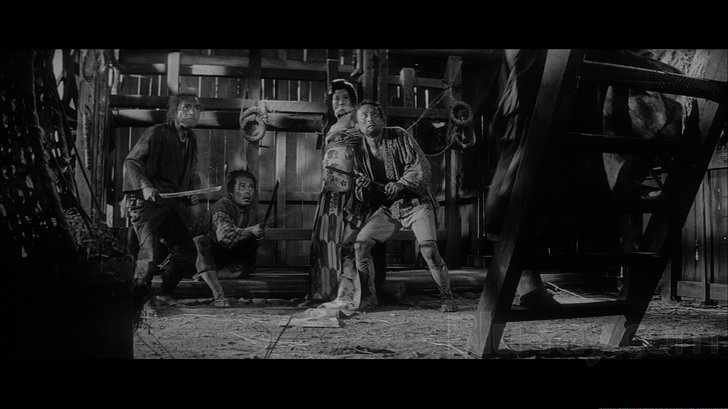
Presented in its original aspect ratio of 2.35:1, encoded with MPEG-4 AVC and granted a 1080p transfer, Hideo Gosha's Three Outlaw Samurai arrives on Blu-ray courtesy of Criterion.
The high-definition transfer is solid. The majority of the outdoor sequences for instance convey wonderful depth and fluidity, with plenty of evenly distributed and mostly well resolved grain (see screencaptures #15 and 16). Occasionally some softness is present and extremely light noise tries to creep in (see screencaptuer #4), but these are limitations inherited from the master, not problematic byproducts of post production corrections. Additionally, contrast levels appear to have been slightly elevated and black levels carefully adjusted. As a result, there are no color and brightness inconsistencies. There are no traces of overzealous sharpening. The high-definition transfer is also free of serious banding and aliasing patterns. Finally, there are no large damage marks, cuts, marks, or warps to report in this review. (Note: This is a Region-A "locked" Blu-ray disc. Therefore, you must have a native Region-A or Region-Free PS3 or SA in order to access its content).
Three Outlaw Samurai Blu-ray Movie, Audio Quality 
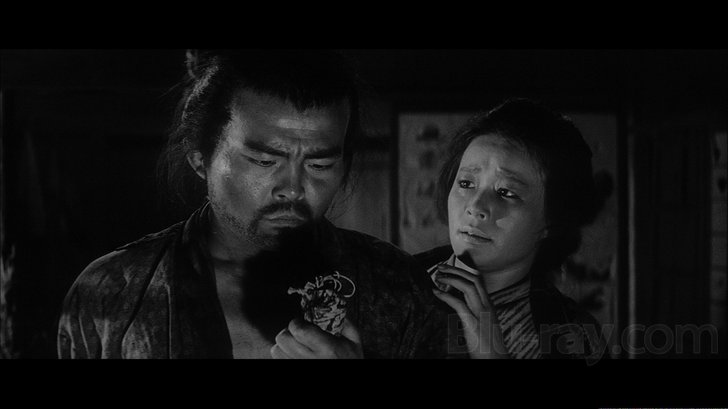
There is only one audio track on this Blu-ray disc: Japanese LPCM 1.0. For the record, Criterion have provided optional English subtitles for the main feature. When turned on, they appear inside the image frame.
The loseless track has a limited dynamic amplitude, but this should not be surprising. During the opening credits, for instance, the music has some depth, but the high frequencies lack the density that newer films would have. The action sequences also sound crisp but lack dynamic intensity. Obviously, however, these are inherited limitations, not transfer related anomalies. This being said, the dialog is consistently clean, stable, and very easy to follow. There is no problematic background hiss either.
Three Outlaw Samurai Blu-ray Movie, Special Features and Extras 
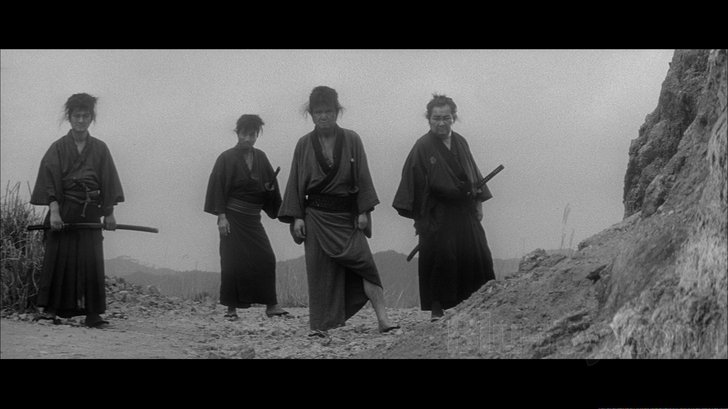
- Trailer - the original theatrical trailer for Three Outlaw Samurai. In Japanese, with optional English subtitles. (3 min, 1080p).
- Booklet - an illustrated booklet featuring an essay by film critic Bilge Ebiri.
Three Outlaw Samurai Blu-ray Movie, Overall Score and Recommendation 
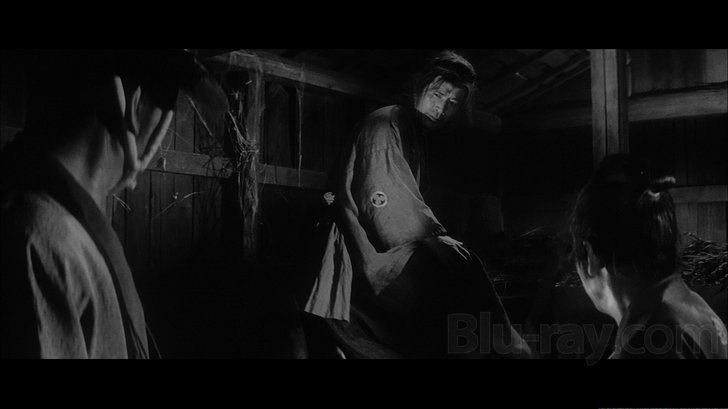
Three Outlaw Samurai is a surprisingly strong and confident debut that easily rivals many of the best samurai films that have reached America during the years. I particularly liked how dark and uncompromising the film is as well as the fact that it does not glamorize its characters. Tadashi Sakai's lensing is also very effective. It would have been great to have some informative supplemental features, but I prefer to have these lesser seen films transition to Blu-ray without extras rather than have them appear on DVD via Criterion's Eclipse Series. HIGHLY RECOMMENDED.
Similar titles
Similar titles you might also like

The Sword of Doom
大菩薩峠 / Dai-bosatsu t˘ge
1966

Harakiri
切腹 / Seppuku
1962

Sansho the Bailiff
山椒大夫 / Sansh˘ dayű
1954

Fight, Zatoichi, Fight
座頭市血笑旅 / Zat˘ichi kessh˘-tabi
1964

Zatoichi Meets Yojimbo
座頭市と用心棒 / Zat˘ichi to Y˘jinb˘
1970

Zatoichi on the Road
座頭市喧嘩旅 / Zat˘ichi kenka-tabi
1963

Zatoichi at Large
座頭市御用旅 / Zat˘ichi goy˘-tabi
1972

Zatoichi and the Chess Expert
座頭市地獄旅 / Zat˘ichi Jigoku tabi
1965

Zatoichi Challenged
座頭市血煙り街道 / Zat˘ichi chikemuri kaid˘
1967

Zatoichi the Outlaw
座頭市牢破り / Zat˘ichi r˘yaburi
1967

Zatoichi and the Chest of Gold
座頭市千両首 / Zat˘ichi senry˘-kubi
1964

Samaritan Zatoichi
座頭市喧嘩太鼓 / Zat˘ichi kenka-daiko
1968

Zatoichi in Desperation
新座頭市物語・折れた杖 / Shin Zat˘ichi monogatari: Oreta tsue
1972

Zatoichi and the Fugitives
座頭市果し状 / Zat˘ichi hatashi-j˘
1968

Zatoichi Goes to the Fire Festival
座頭市あばれ火祭り / Zat˘ichi abare-himatsuri
1970

Zatoichi Meets the One-Armed Swordsman
新座頭市・破れ!唐人剣 / Shin Zat˘ichi: Yabure! T˘jin-ken
1971

The Tale of Zatoichi
座頭市物語 / Zat˘ichi monogatari
1962

The Life of Oharu
西鶴一代女 / Saikaku ichidai onna
1952

Kuroneko
藪の中の黒猫 / Yabu no naka no kuroneko
1968

Throne of Blood
蜘蛛巣城 / Kumonosu-j˘
1957